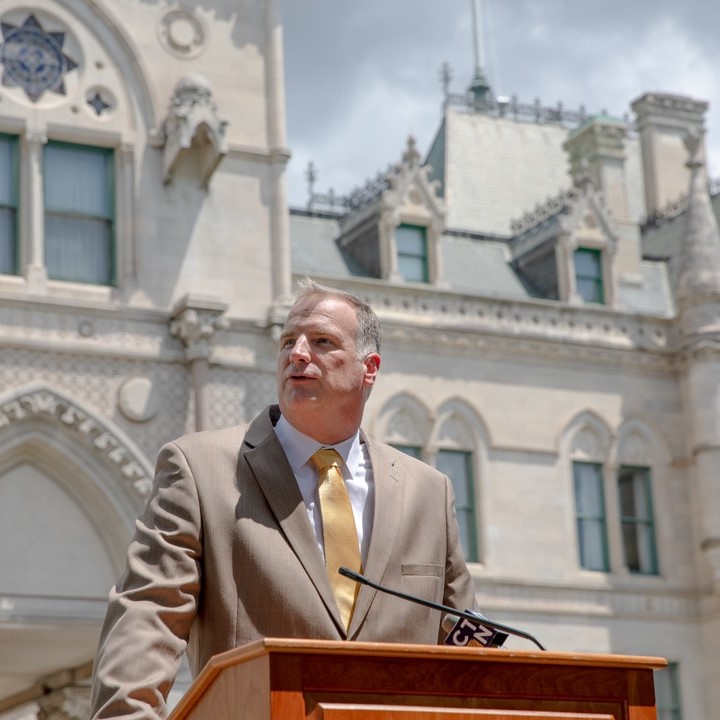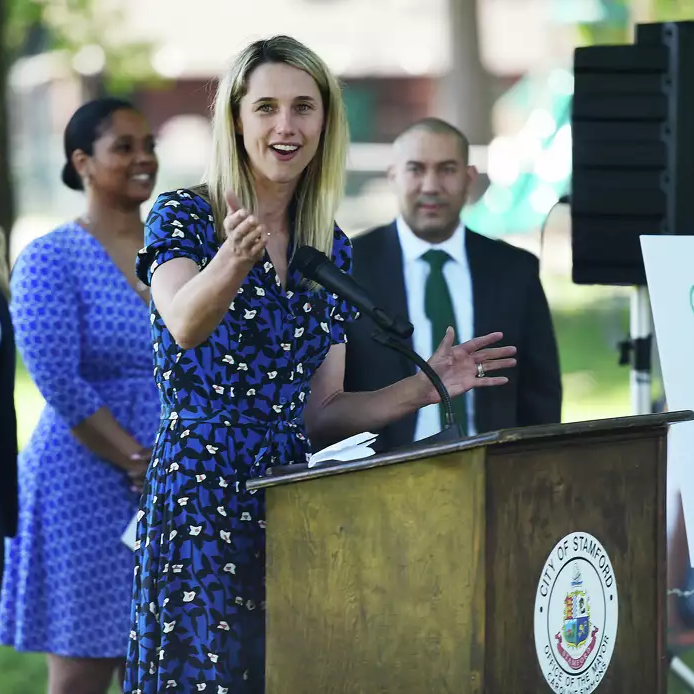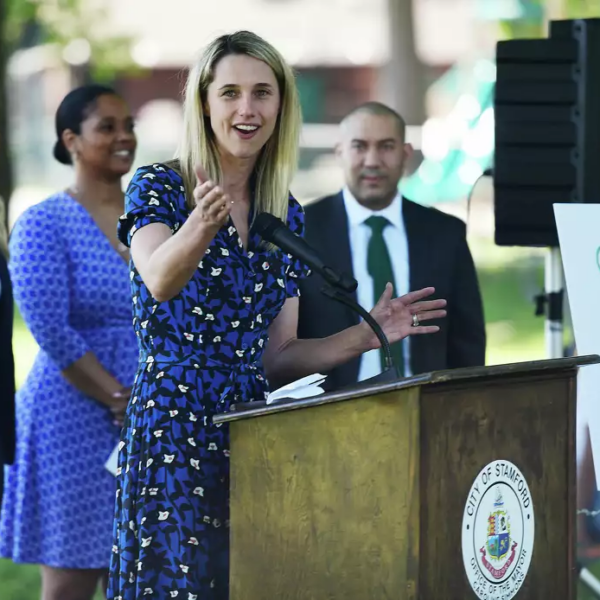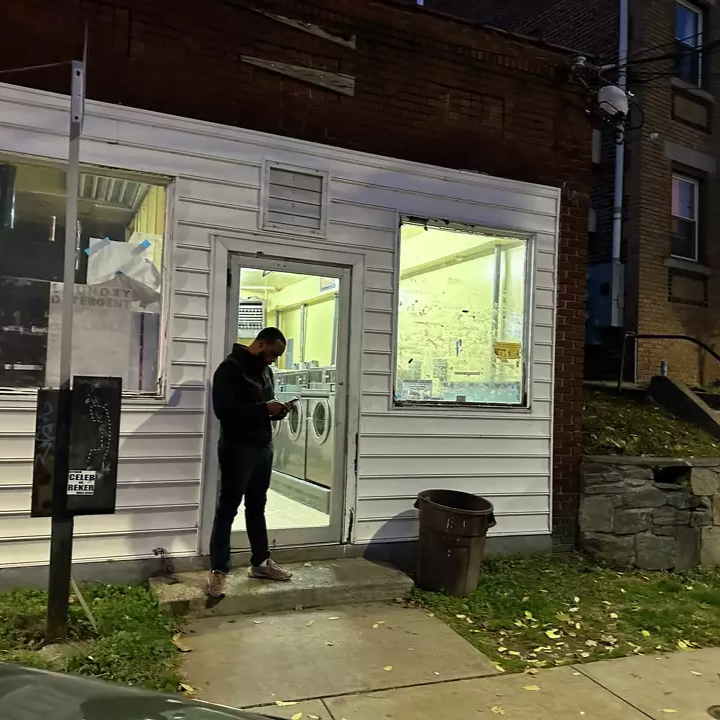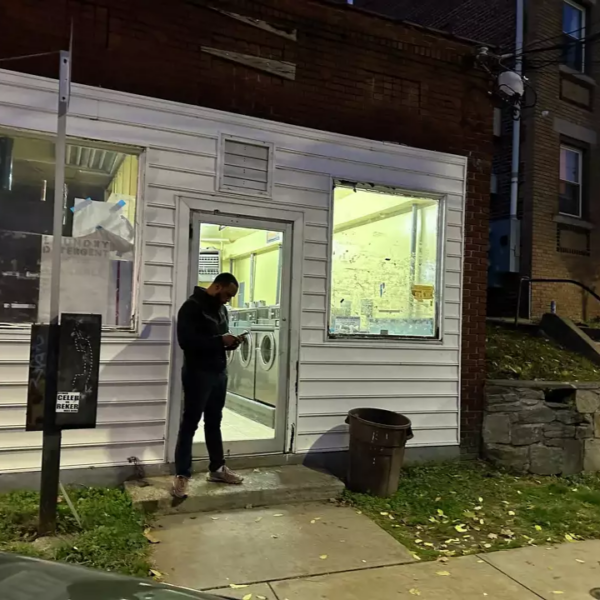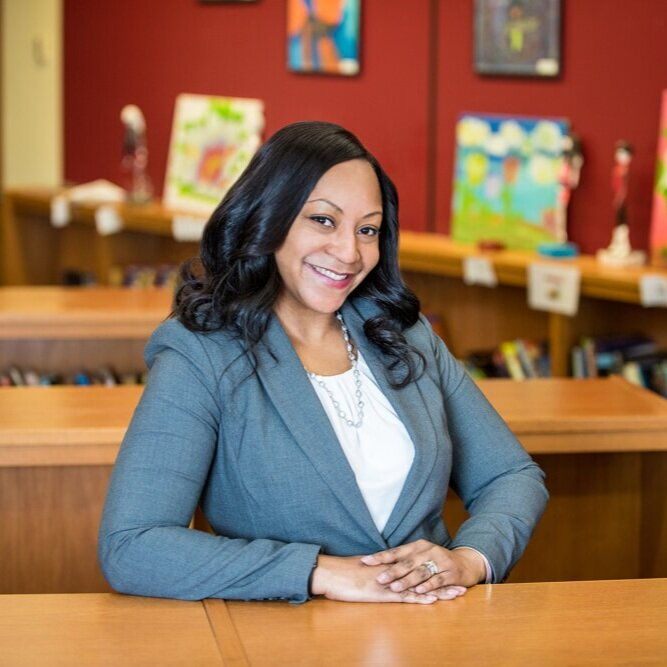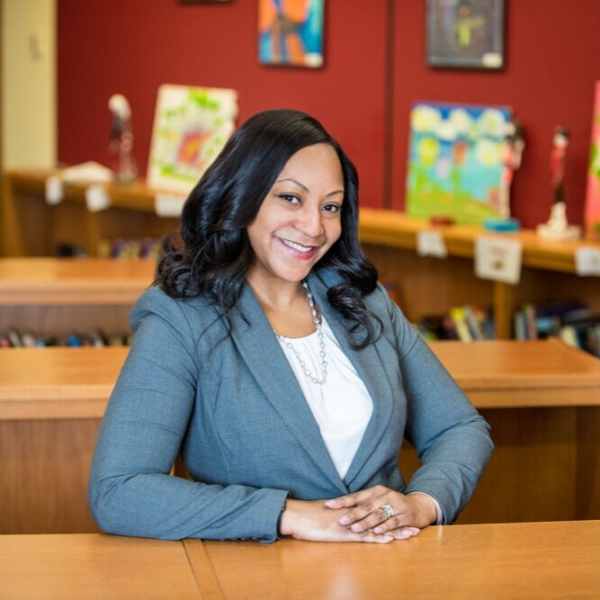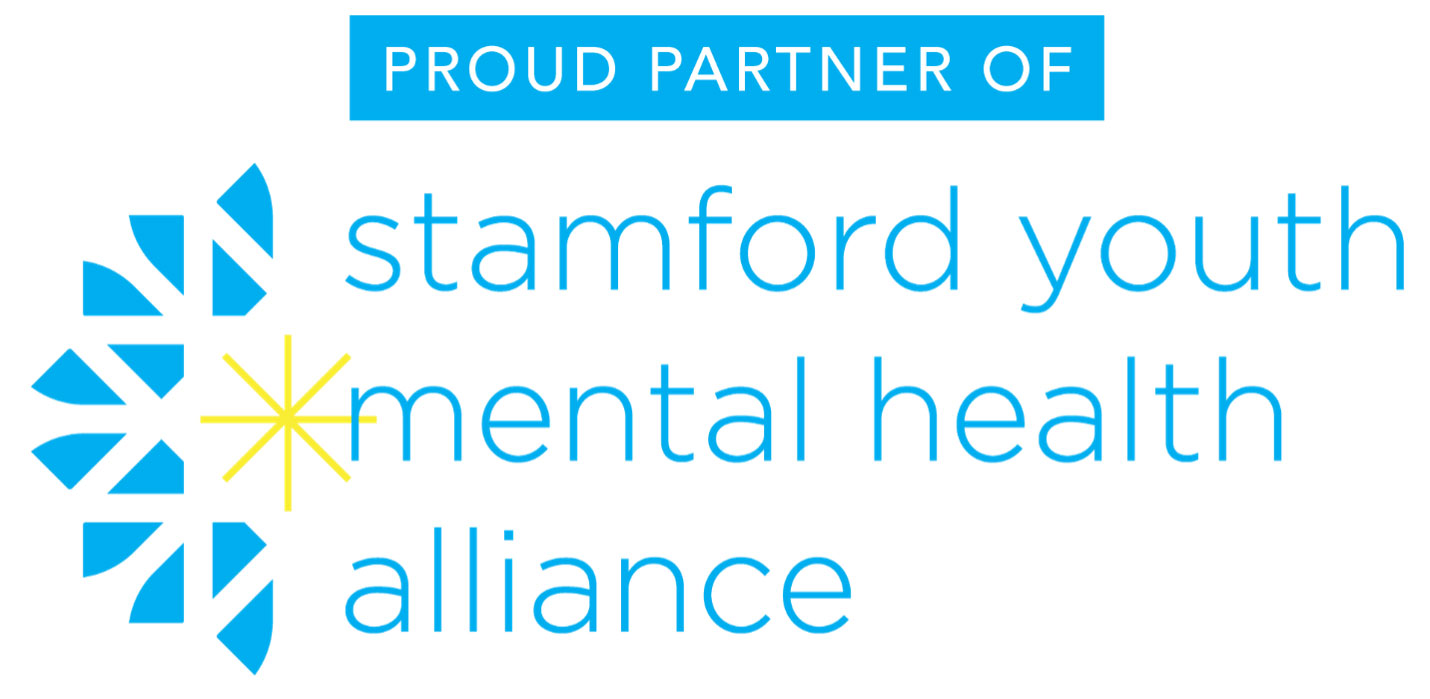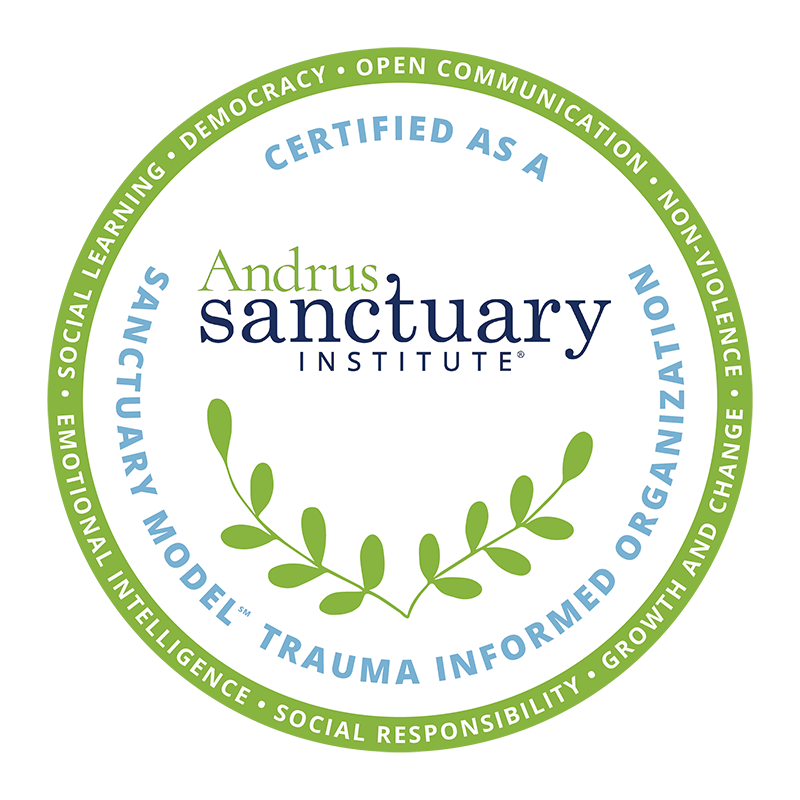CCM Opens Effort to Save At-Risk Youth, Overhaul CT Government
Pictured: Joe DeLong, executive director of the Connecticut Conference of Municipalities, in 2020. Credit: Yehyun Kim / CT Mirror
This is a reposting of an article by and that appeared in the CT Mirror.
Connecticut’s failure to coherently confront a crisis of young people disconnected from the worlds of education and work costs the state $750 million annually and poses long-term dangers to the state’s social fabric and economic growth, the Connecticut Conference of Municipalities says in a new report.
The solution, CCM argues in a report to be released Wednesday after weeks of private briefings for Gov. Ned Lamont and others, is a decade-long strategy for increasing investment, accountability and transparency in broad swaths of government, including K-12 education, job training and mental health.
Central to the document is a new twist on an old struggle by municipalities to lobby for higher state aid for education. By calculating the estimated cost of inaction at $750 million, it helps make an economic case for phasing in more than $900 million in additional spending: $545 million on education aid and $408 million on social services.
CCM is seeking a targeted expansion of youth support services at the local and state levels, with enhanced coordination, planning and accountability. Behavioral counseling, career planning and workforce development, homelessness prevention, recreation and other services all would be prioritized.
The initial cost to begin the expansions would be closer to $150 million.
The document is the product of the 119K Commission, launched in March by CCM, aided by the research and resources of a Connecticut philanthropy, Dalio Education. The name refers to 119,000 young people ages 14 through 26 whom Dalio previously identified as disconnected or at risk of being disconnected.
The commission calculates that disconnected and at-risk young people, who it says are more likely to drop out of school and the workforce, are an annual burden of $400 million on state services and represent $350 million in lost tax revenue, plus billions more in unrealized growth in the state’s gross domestic product.
“This strategy covers 10 years, but leadership and action are required now,” the organization asserts in an introduction to a 114-page report titled, “Young People First.”
The document lands as the state legislative campaign season is winding down and the Lamont administration and lawmakers begin to confront the myriad possibilities and challenges in crafting the next biennial budget in a 2025 legislative session that opens in January.
Prime among them is the question of whether Connecticut should loosen the budget controls that have constrained spending in favor of paying down debt.
The 119K Commission proposes a major spending increase — a $545 million annual boost to Connecticut’s chief grant to school districts, the Education Cost Sharing program — and numerous ambitious organizational changes in how government assesses needs, delivers resources and services, and measures impacts.
The financial and organizational changes each pose potential political challenges.
Unclear is whether CCM, the 119K Commission and the coalition they are trying to build around their priorities will find a champion in the governor’s office or any other corner of the state Capitol.
“I think a role of CCM, the commissioners, the coalition is to go out there and to continue to educate people on this and the fact that there is a both a massive economic victory at the end of doing this the right way, as well as a massive social victory at the end of doing it the right way,” said Joe DeLong, the executive director of CCM.
The ECS boost would represent a 24% increase in a program that will send slightly less than $2.3 billion to school districts this fiscal year. The grant program already is amid a long-term initiative passed in 2017 to increase local education funding steadily through at least 2028.
But the 119K Commission noted that despite this effort, the state is losing ground in its efforts to support education. Funding per pupil has grown by 2.43% since 2017, while inflation has risen by 3.64%. Effectively, state funding per student is down $400 over the past seven fiscal years.
The commission’s plan not only would add ECS dollars to neutralize inflation but would expand assistance for districts in regions of concentrated poverty or with large numbers of students with disabilities.
Aside from claiming inadequate K-12 funding, the commission asserts that Connecticut suffers from poor coordination among state and nonprofit providers and an unwillingness to weed out non-performers. The result is a fragmented and underfunded collection of services that can be hard to find and harder to access, the report said.
“There’s a lot of people out there that are doing really good work, but it’s not being done to scale, and it’s being done in a vacuum,” DeLong said. “We have a lot of systems and certain services that are being funded across the state that are not in any type of a coordinated network.”
Achieving many of the commission’s recommendations would require a willingness by the governor and General Assembly to engage in difficult conversations about funding formulas, grant standards, graduation requirements and the competing interests in crafting tax-and-spending policy.
It shies from recommending raising new revenue through taxes or engaging in the continuing debate over tax equity in Connecticut, other than mildly endorsing a state child tax credit. Such a credit would cost the state millions in lost revenue and compete with the CCM priority of significantly more state aid for education.
But the commission floats an idea for issuing “social impact bonds.” Certain initiatives could be financed with borrowed dollars to be paid with future income and other tax receipts generated by the increased prosperity Connecticut would enjoy as more youth develop productive careers and require fewer services.
Traditionally, legislators wouldn’t consider an annual expenditure as large as the proposed $545 million ECS bump — even one phased in over several years — without a tax hike or some other form of major revenue boost to cover a portion of the cost.
Gov. M. Jodi Rell pitched a two-stage state income tax hike in 2007 to fund her plans to bolster education aid to schools, exempt cars from municipal property taxes and reimburse communities for the lost vehicle tax revenue. It died quickly.
And DeLong conceded that, until recently, legislators wouldn’t have any option other than raising taxes to implement the commission’s full proposal. But lawmakers and Lamont do have one huge pool of existing revenues they could tap by restructuring budget controls dubbed “fiscal guardrails” by supporters.They have added roughly $4 billion to the emergency budget reserve in seven years, while simultaneously generating another $8.5 billion in surplus to whittle down Connecticut’s massive pension debt, a problem created over seven decades and still far from resolved.The chief engine driving these savings, the “volatility adjustment,” bars legislators from spending a portion of quarterly income and business tax receipts, revenues that tend to fluctuate rapidly from year to year.Lamont’s budget office estimated in its September monthly report to the comptroller that state finances would close the 2024-25 fiscal year next June 30 with almost $1.2 billion in saved volatile revenues to complement a $109.2 million operating surplus.Even if the spending limits are loosened, ECS and K-12 education will not be the only areas competing for funds in 2025.
Medicaid rates for doctors who treat the poor haven’t been adjusted in any broad-based fashion since 2008. Community college tuition this fall is up 11% from two years ago. Nonprofit agencies that deliver social services say they lose more than $450 million annually due to state payments not keeping pace with inflation since 2007.
And the United Way of Connecticut is leading a push backed by many other groups to establish a child tax credit within the state income tax system. The most popular proposal was one offered three years ago by then-Rep. Sean Scanlon, D-Guilford, who is now state comptroller.
That would deliver up to $600 per child, a maximum of $1,800 per household, to middle-income families, with an annual cost ranging between $300 million and $400 million.
DeLong counters that the state Constitution guarantees all residents the right to a quality public education, which gives the commission’s recommendations priority.
But the Connecticut Supreme Court ruled otherwise in 2018, concluding the Constitution required only that the state fund “a minimally adequate educational system.”
Organized around four “strategic pillars” and 22 “aligned actions,” the CCM report reads more like a strategic plan than a granular legislative agenda, though some of the suggested action items are quite specific and independent of major funding increases.
The strategic pillars are labeled “coordination,” “conditions,” “capacity” and “coalition.” Most of the action items are directed to creating stronger conditions for youth success in school and beyond, and increasing the capacity of schools, non-profit providers, workforce training and reintegration programs for incarcerated youth.
Beneath those broad goals are detailed recommendations, such as phasing out ineffective programs for needy school districts and shifting money to establishing “Community Schools in high-poverty areas that provide wraparound supports” in health, housing, family support and other services.
One program recommended for elimination is the Commissioner’s Network Schools, which provides extra resources to schools meeting certain criteria. The report says those schools have seen an average decline in graduation rates of 10.4% over five years, compared to a 2.1% decline in other schools.
When fully implemented, the annual cost of the aligned actions is estimated at $408 million on top of the $545 million in added ECS funding. The plan is to phase in funding over 10 years, with a goal of reducing the number of at-risk and disconnected young people by half over that time.
One suggestion would create a new power center: a statewide Office of Youth Success with “statutory authority and a singular focus of leveraging resources and data to align and coordinate stakeholders and systems” — in other words, an office empowered to wring out duplicative and inefficient services.
Another would reimagine the state’s 2-1-1 phone line, which is intended to be the all-purpose portal for seeking help on anything from homelessness to getting into job training. The commission proposes a transition to a digital application, as well as a corps of success counselors.
DeLong said the report reflects concerns and suggestions collected in conversations with stakeholders, including 225 young people from all corners of the state.
“One of the things that we were told on a fairly regular basis was at some point, before they turned to the streets, that they had actually turned for help” to various places without success, DeLong said.
The 119K Commission was led by three chairs: Torrington Mayor Elinor Carbone; Andrew Ferguson, the co-chief executive at Dalio; and Josh Brown, a banking executive and leader of Domus, a non-profit serving teens in Stamford. A dozen of the 15 commissioners are chief elected officials of Connecticut municipalities.
The Boston Consulting Group, which collected and analyzed the data for the original report on disconnected youth Dalio issued almost a year ago to the day, staffed the commission through a grant from Dalio.
Link to full article HERE.
Note: The CT Mirror receives funding from the Dalio Education foundation.

